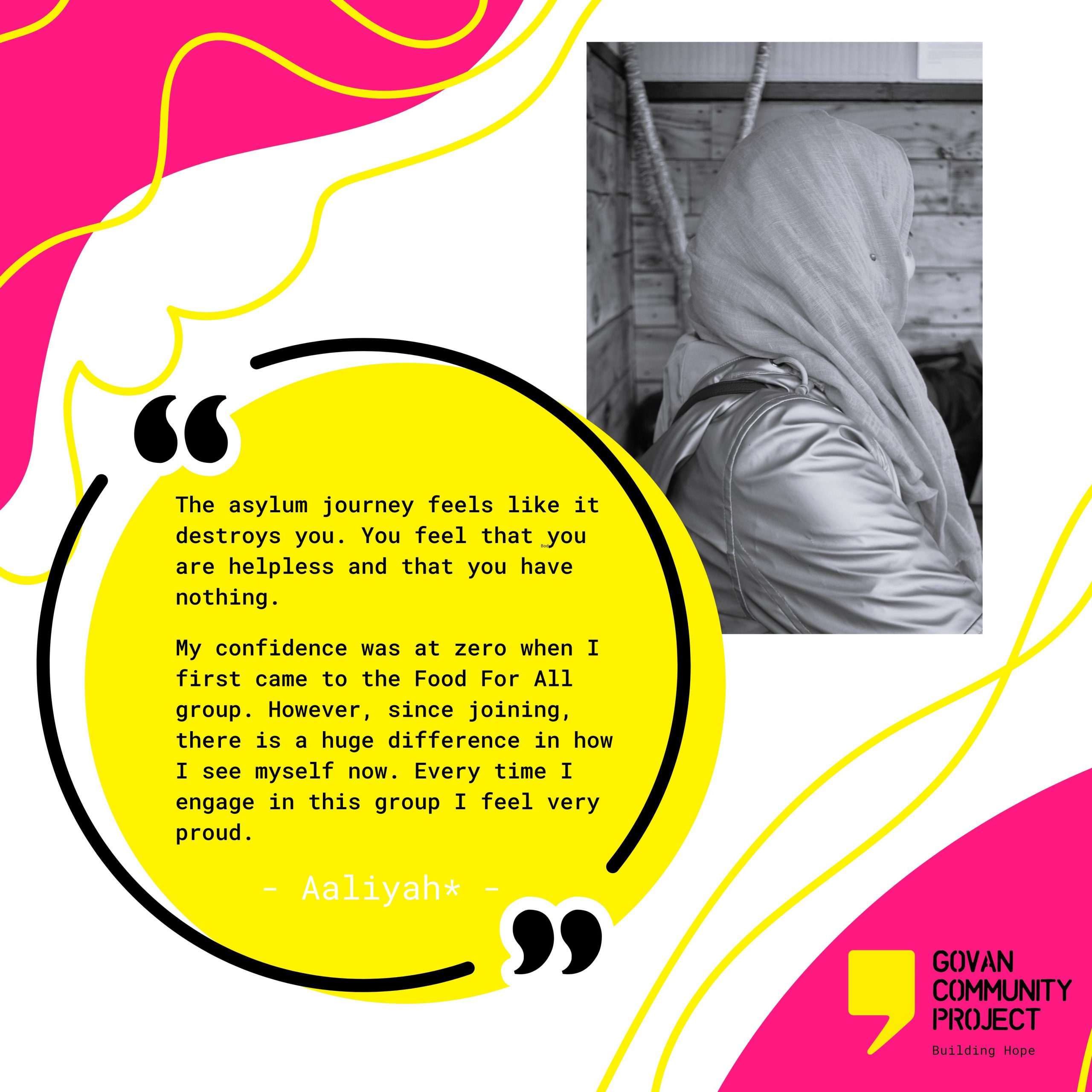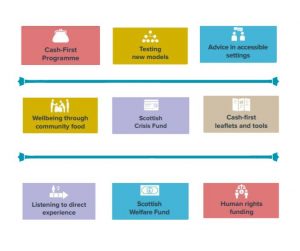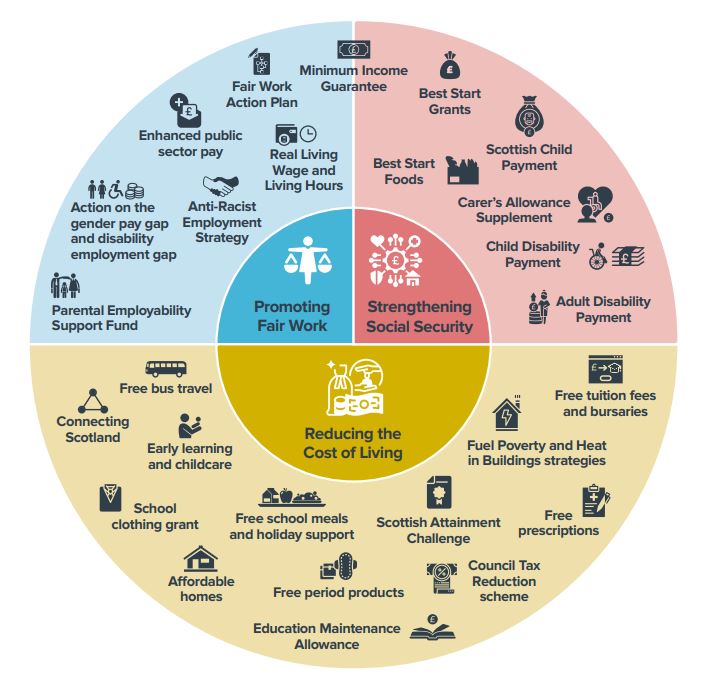Tag: food for all
Since 2020 the Food For All group, in collaboration with Nourish Scotland , has worked on the Dignity in Practice Project with funding from the Scottish Government’s Fair Food Fund. One participant – Aaliyah* – has been an integral part of the group for several years and has facilitated workshops, co-designed resource materials and supported other group members throughout the duration of the project.
Reflecting on the positive difference that the group has made on her life in Glasgow, Aaliyah recalled: “My confidence was at zero when I first came to the Food For All (FFA) group. However, since joining the group, there is a huge difference in how I see myself now. Every time I engage in this group I feel very proud.”
The asylum journey is incredibly gruelling and undignified. Thinking back to her life a few years ago, Aaliyah said: “The asylum journey feels like it destroys you. You feel that you are helpless and that you have nothing. You feel like you are nothing because you are not able to contribute to anything.”
Despite feeling in despair about her journey through the asylum process, Aaliyah decided to join the FFA group. She told us about the many conflicting emotions she felt at the time. “I was very nervous because there were a lot of things I couldn’t do. How could I speak in front of a group of people when my English was not good? I was not well connected in the community. I was not feeling very confident.”
Aaliyah was attending a number of different community groups at the time she joined FFA, sharing stories of the asylum process. The FFA group is the one group that Aaliyah connected with the most and sees herself continuing with.
“All the other groups felt temporary. You can go and spend an afternoon there having tea, but once their funding is gone then there is no impact. I am [now] out of the asylum process, but I am still stuck there because this was my journey. My friends are still in the asylum process and they are still struggling. Because they are struggling, I am struggling, because I can feel their pain. I haven’t heard from those groups in a long time, however the FFA group is still going strong and it makes me feel like we are bringing about change.”
Aaliyah said the FFA group has had an overwhelmingly positive impact on her confidence. “Since joining the group I now feel such a change and when I am presenting in front of a big group I realise how far I have come. I had the feeling before that ‘no one listens to asylum seekers’ and that ‘the response has been very bad’. However, with the Food For All Group, the last workshop that we did face to face, I really felt that people do want to learn more about the asylum journey and how people are struggling.”
The importance of sharing space with other people who have been through the asylum process is very important to Aaliyah. The success of the FFA group is evident through the strong support that the group members provide to each other. Aaliyah told us she feels 100% supported by the group both in sessions and also when delivering workshops.
She added: “The FFA group is a strong, and unique team because the group is comprised of members with different, individual personalities; this makes us a great team. When I joined this group, I remember I was a bit shy and I wanted to say something. Sara was in the same journey as me and I was stuck with my words and she came in and she knew what I was trying to say, she helped me to find the right words to say it. I felt very grateful that she knew what I was thinking. It makes you feel that you are not alone. You are in a group of people that understand you. They see you.”
Aaliyah is hoping to see positive change for herself, the group members and the whole asylum system.
*Name changed to protect anonymity

The Food For All group is launching resources and workshops that are designed and delivered by people with lived experience of the asylum process. The Food For All: Dignity In Practice workshop is aimed at staff and volunteers delivering community food services, and provides space to reflect and learn from the very people who use those services.
This workshop is being offered at a time when there is a human crisis right here on our doorstep. Asylum seekers are navigating a maze of barriers and obstacles to employment, education and food. The Food For All group raises awareness of the specific challenges people in the asylum process face, building understanding and empathy for those in that system, and inspires food providers to embed dignity in the heart of their practice.
Philippa Roloff, Food for All Project Lead, said: “We believe that everyone deserves dignified access to food. We believe that everyone working in community food provision should have the opportunity to gain knowledge and understanding of the asylum process, to adapt their practice and break down the barriers faced by community members in the asylum process.”
Through collaboration with Nourish Scotland, the Food For All group has been working on the Dignity In Practice Project since 2020. We are delighted to finally be sharing the expertly created workshop with community food providers. Our FREE, certified workshops are an opportunity for teams to come together with people with lived experience of the asylum system in a safe space to reflect and learn from each other.
By better understanding each other’s needs, we can help build capacity in community food settings and the communities they serve, to support each other and promote the dignity of everyone.
This month, the Scottish Government finally published its much-anticipated plan to end the need for food banks in Scotland. “Cash-First: Towards Ending the Need for Food Banks in Scotland” sets out a human rights approach to tackling food insecurity and outlines nine collaborative actions the government will take over the next three years to improve the response to financial hardship and start to reduce the need for emergency food parcels.
The paper summarises the range of preventative actions the Scottish Government will take that will help realise the long-term vision of ending the need for food banks by improving incomes and reducing costs. Below is the summary of the nine actions identified by the government to improve the response to the crisis.

Govan Community Project’s Food for All Group has been involved in the consultation process, providing testimonials and advice from experts by experience, particularly around food insecurity in the asylum process.
Philippa Roloff, Food Projects Lead at Govan Community Project, said:
“The plan is undoubtedly groundbreaking- it’s the first of its kind not only in the UK, but across the world. We applaud the Scottish Government’s unflinching and explicit condemnation of the UK government’s policies that have ‘inflicted’ poverty and harm. However, mention of the UK government’s hostile environment policies is notably absent, as are any meaningful actions that will benefit the thousands of people in the asylum process in Scotland who are forced to rely on food banks long term, because of the shamefully low asylum support payments.
“Given the involvement of GCP’s Food for All Group in the Scottish Government’s Direct Experience Reference Group and the consultation process, we are especially disappointed that the plan does not go further to end the need for food banks for all.”
